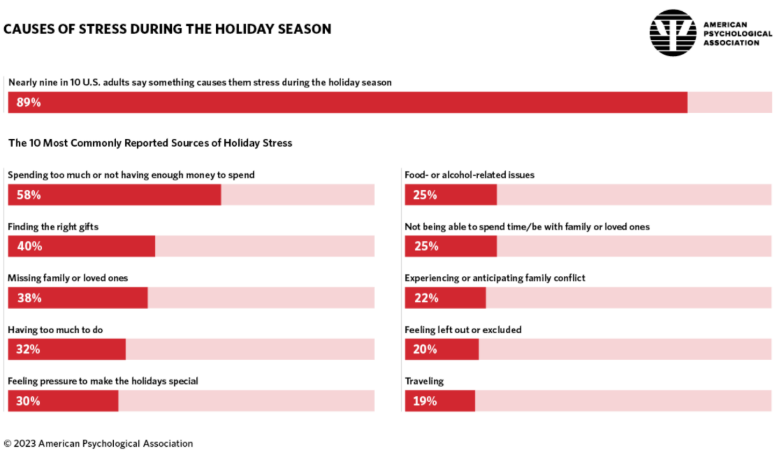
Jangled Nerves? You’ve Got Lots of Company,
and We’ve Got Your Back!
Are your days all merry and bright during the holiday season? If so, you can stop reading (or skip to the end to find out which holiday song jangles everyone’s nerves this time of year)! For everyone else, let’s take a look at the causes and consequences of holiday stress and what we can do to make ourselves and those around us feel better this season.
First, some numbers. In 2023, the American Psychological Association and the Harris Poll conducted a survey to determine whether or not Americans feel particularly stressed at this time of year. Did we really need a survey for that? A whopping 89% (almost 9 out of 10 people) said that “concerns such as not having enough money, missing loved ones, and anticipating family conflict cause them stress at this time of year.”
This year, the political climate (“polarization” is Merriam-Webster’s 2024 Word of the Year!) and higher prices are conspiring to make things even more stressful. So don’t let all the “holly, jolly” and “ho, ho, ho” fool you. If you’re feeling sad or stressed, you are definitely not alone. Let’s look at some of the common causes of holiday stress and the ways we can prevent them from destroying our holidays.

Missing and Not Being Able to Spend Time with Family or Loved Ones
In the APA poll, 38% of respondents reported that missing loved ones was a major cause of holiday stress and 25% reported that not being able to spend time with loved ones caused them stress. Spending time with family and those you love is a fairly universal expectation for the holidays. It can be very stressful when you are unable to do that. Spending the first holiday without a lost loved one can be particularly upsetting and that can exact a heavy toll on the heart, mind, and body. In cases of heartbreak-related stress, your best stress-reduction tool is reframing your thinking. Experts suggest the following steps to reframe negative thoughts and replace them with more positive, constructive perspectives:
- Practice Gratitude: Shift your focus toward gratitude by reflecting on the positive aspects of the holidays. Talk about your favorite holiday memories with your loved ones. One way to reframe thinking is to think about how lucky you have been to have made the memories you have.
- Embrace Flexibility: Be open to flexibility in your plans and traditions. Sometimes, unexpected changes can lead to new and enjoyable experiences. Reflect on what your missing loved one might think about your new holiday tradition. Think about how your new tradition connects with those no longer with you. Imagine that every time you engage in your new tradition, you will think of those you have lost and smile.
- Seek Support: Don’t hesitate to lean on friends, family, or a support network when you’re feeling stressed. Sharing your feelings and seeking help can provide relief.
- Stay Connected with Those Around You: Prioritize meaningful connections with loved ones and cherish the moments you spend together. Quality time and genuine connections can help mitigate holiday grief and stress.
- Practice with an Open Heart: Reframing thinking is like working a muscle. It may ache in the beginning, but with practice, your ability to reframe will get stronger, and with time, replacing stressful, negative thoughts will become much more natural.
Having Too Much to Do and Feeling Pressure to Make the Holidays Special
This kind of holiday stress is the kind we may often experience throughout the year. Having too much to do and feeling pressure to be perfect is the kind of stress that creates feelings of anxiety that can manifest themselves physically. Some reframing will help with anxiety, but this is where centering, stress-reducing exercises can work wonders.
- Focus on What You Can Control: Recognize that there are certain aspects of the holiday season you can control, such as your attitude, priorities, and responses to stressful situations. Concentrate your energy on those areas.
- Set Realistic Expectations: Understand that perfection is not necessary or attainable. Accept that things may not always go as planned, and that’s okay. Embrace imperfections as part of the holiday experience.
- Learn to Say No: Avoid overcommitting yourself by setting clear boundaries and managing your time effectively. Learn to say “no” to additional obligations when necessary. It’s not easy but very freeing once you get the hang of it.
- Use Stress-reducing Breathing Exercises to center yourself and lower your heart rate. You can find some stress reducing techniques on Learn.Amaze. But you will be surprised at how effective it is to simply take four slow deep breaths every hour.
Increased Conflict When Family Members Get Together
Many of the strategies outlined above will work when the inevitable insults and arguments arise. But here are a few more to add to your toolkit:
- Relax Beforehand: Before a family event, do something relaxing. You might try stretching or listening to music. Seeing difficult relatives without feeling stressed will give you a fighting chance to react calmly to anything they do or say that might bother you.
- Keep Potentially Upsetting Topics Off-limits: Politics and religion are usually topics that people disagree about and can lead to heated debates. And this year, the recent election may elicit gloating or anger. By now, you know where family members stand on these topics, so agree beforehand to keep high-conflict subjects off-limits.
- Accept That the Only Thing You Can Control is Your Reaction: Even when you take the most difficult topics off the table (pun intended), family members can push our buttons. A difficult relative may ask: “Are you ever going to get married?” It may seem harmless, but it may also strike a nerve and make you feel uncomfortable. You can’t stop people from bringing up controversial subjects or asking rude questions, but you can monitor and modify your own reactions. So don’t engage. A simple, “let’s not get into that now” will go a long way.
And, if you were wondering what Americans think is the most annoying holiday song, we have the answer. This year Mariah Carey’s “All I Want for Christmas Is You” topped the list in surveys of radio listeners in BOTH the US and the UK. Last year’s winner, Ariana Grande’s “Santa Baby” didn’t even make the list, perhaps thanks to the “Wicked” effect. In second place, was The Chipmunk Song in the US. Our least favorite, “Grandma Got Run Over by a Reindeer,” second last year, was apparently out of earshot and got a pass this year.